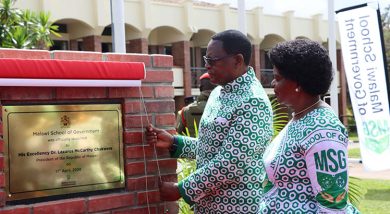MPs accused of laxity in maizegate
The Consumers Association of Malawi (Cama) has accused members of Parliament (MPs) of failing in their oversight role by giving the Executive powers to handle the Malawi-Zambia maize deal unilaterally without involving other stakeholders.
Cama executive director John Kapito says it was a “big mistake” for the MPs to give the Executive and Agricultural Development and Marketing Corporation (Admarc) an open cheque to do the procurement without putting up measures to control fraudulent and corrupt practices.
Two committees of Parliament—the Public Accounts Committee and the Parliamentary Committee on Agriculture, Irrigation and Water Development—are conducting an inquiry into the procurement of maize by State grain marketer – Agriculture Development and Marketing Corporation (Admarc) – to establish whether there was an element of fraud and corruption in the deal.

Speaking in Lilongwe when he appeared before the joint committees yesterday, Kapito apportioned the blame on the Legislature for leaving the Executive and Admarc to handle the procurement deal alone.
“By delegating this huge responsibility to Executive and Admarc without involving other relevant stakeholders, including you, was a big mistake,” he said.
He emphasised that MPs needed to come up with stringent measures to prevent people [with ill-motives] to take advantage of the deal to steal government money.
In an interview after the meeting, Parliamentary Committee on Agriculture, Irrigation and Water Development chairperson Joseph Chidanti Malunga said he agreed with Kapito’s observation.
He, however, stated that the Legislature was not wholly left out as it was the one that debated and authorised the loan that allowed for the procurement of the maize.
“But this is a lesson that we have taken as a committee. We look forward to ensuring that we provide an oversight role in such procurement processes in the future,” said Malunga.
Chancellor College law expert Edge Kanyongolo said he could not competently judge whether MPs share the blame or not.
“Unless I get to know what specific role the MPs were supposed to play in the maize procurement process, I may not be in the right position to assess them,” said Kanyongolo.
Meanwhile, the MPs found wanting a report by Cama on what really transpired in the Malawi-Zambia maize deal.
Kapito told the committee that Cama initiated the research to ascertain if indeed the procured maize was being delivered to Admarc.
“We did not rely much on what the public was saying. We did not rely much on what was in the newspapers. In our study, we were simply going beyond what the public was saying on the matter,” he said.
However, the MPs had problems with the report since researchers did not append a list of interviewees and the methodology used to gather information.
Chitipa North MP James Munthali (People’s Party-PP) challenged Kapito to provide evidence to back his research findings.
Asked: “What methodology did you use in gathering this information? Who were your interviewees and how did you identify them? This is critical as it will enable us to get to them in our inquiry should there be a need.”
In response, Kapito said his association carried out desk research and in-depth and personal interviews with Admarc and the banks. He did not mention the banks he engaged in the study.
He further explained that other people were hired to conduct in-depth interviews in Zambia for the same task.
“What we might not have are the invoices. Our research question was to look at whether indeed there was any money paid to the supplier.
That’s what we wanted to establish,” said Kapito. But the MPs wondered how Cama could, in its study, ignore [mis]procurement issues.
Dowa West MP Alexander Kusamba Dzonzi (Malawi Congress Party-MCP) asked Cama to explain whether it had established the quantity of maize Admarc has received from Zambia.
Kapito said the association was “being told two different figures”.
“We were not able to get (GRNs) goods received notes,” he said. n





